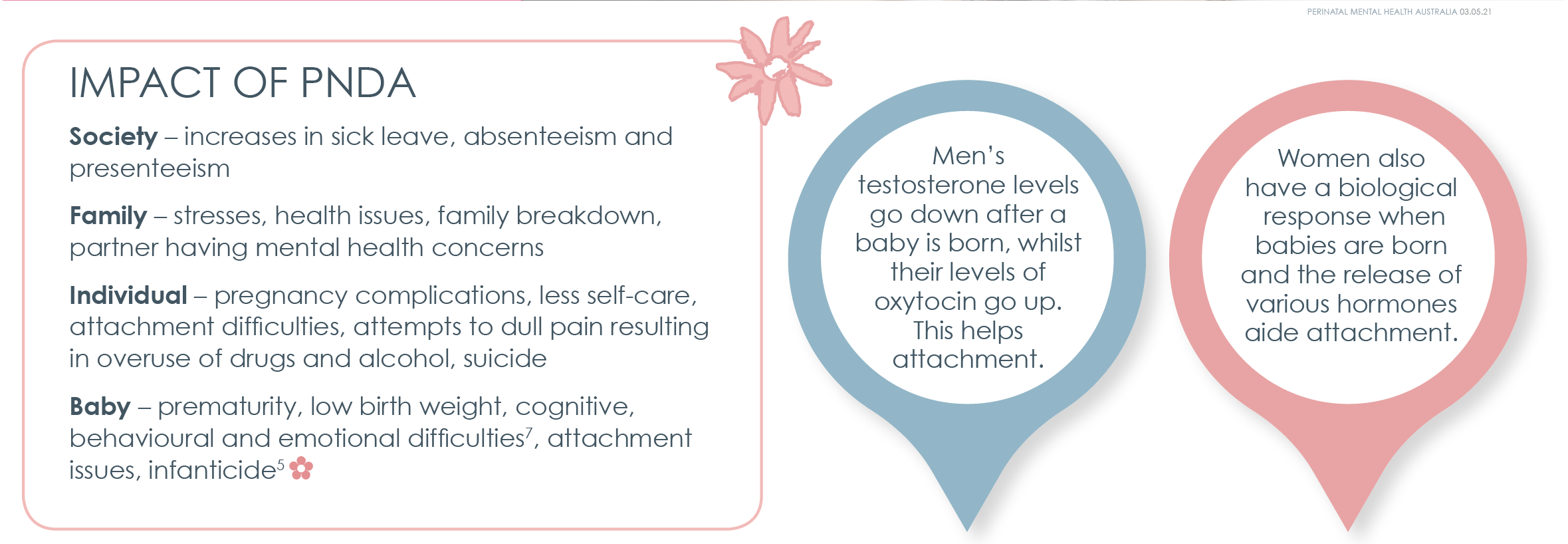
Perinatal mental health in Australia

Baby blues
Women experience baby blues and this is not depression. It occurs between days 3-10 after birth and goes away by itself with supportive care. Women can experience mood swings, teariness, feeling overwhelmed and anxiety. It’s a reaction to hormonal shifts3 and adjustment to being a mum.
Risk factors for developing PNDA1
- Psychological: e.g. birth trauma, grief and loss.
- Social: e.g. isolation, lack of access to safe and culturally responsive support.
- Biological: e.g. mental health history, baby related factors, physical health issues.

Signs and Symptoms
Depression
- Feelings of hopelessness, inadequacy, failure, anger.
- Guilt or teariness.
- Loss of appetite and sleep issues not related to baby.
- Lack of motivation.
- Sad, persistent low mood.
- Thoughts of self-harm or suicide.
Anxiety
- Panic attacks.
- Physical sensation e.g. tight chest, heart palpitations, tense muscle sensations.
- Intrusive, scary thoughts.
- Fear that stops you going out or checking baby constantly.
- Irritability.
- Finding it hard to relax.
- Agitation.
From a Gidget Angel

How Gidget Foundation Australia helps
- Emotional Wellbeing screening program.
- Gidget House.
- Start Talking telehealth.
- Gidget Village group treatment.
- Gidget Virtual Village Facebook group.


Steps in recovery
Despite the fact that the majority of women are engaged in regular health appointments in the perinatal period, most women with perinatal mental health issues are not identified by care providers.
Acknowledgement and diagnosis
Activities at home: self-care, time out, mindfulness, daily exercise, focus on healthy eating and gut health, re-working sleep habits, kindness to self, re-adjusting expectations.
Social supports: friends, family, groups – online or in person, health professionals, helplines.
Seek more targeted assistance including professional counselling and medication or alternate therapies e.g. acupuncture if needed from perinatal specialists.
What needs to happen?
- Increase awareness of PNDA in the community and with health care providers.
- Provide specific support to partners of new mums.
- Develop online support resources and networks as well as the more traditional face to face counselling.
- Development of and access to free in-patient hospital mother and baby units Australia wide.
- Screening in perinatal care with specific mental health questions in conjunction with referral and access to timely perinatal support services.
- Specific training of perinatal mental well-being to health professionals and students in tertiary education.
- Being more culturally aware in our service delivery.
- Building a workforce supportive of the perinatal period.
References
- Smorti M, Ponti L, Pancetti F. A Comprehensive Analysis of Post-partum Depression Risk Factors: The Role of SocioDemographic, Individual, Relational, and Delivery Characteristics. Frontiers in Public Health, 24 Oct 2019.
- Hain S, Oddo Sommereld S, Bahlmann, F, Louwen F. Risk and protective factors for antepartum and postpartum depression:a prospective study Journal of Psychosomatic Obstetrics & Gynecology 37(4):119-129. December 2016.
- https://healthyfamilies.beyondblue.org.au/
- Ellwood D. FactCheck Is suicide one of the leading causes of maternal death in Australia. The Conversation:http:// the conversation.com/factcheck-is suicide-one-of-theleading-causes-of-maternal-death-in-australia 65336. 2019.
- PANDA submission to the productivity commission mental health inquiry April 2019.
- PNDA cost evaluation undertaken by Price waterhouse Coopers Consulting (Australia) Pty Limited in November 2019.
- Chan J, Natekar A, Einarson A, Koren G. Risks of untreated depression in pregnancy, Can Fam Physician. 2014 Mar; 60(3):242-243.
- Yelland j, Brown S, Krastev A, Perlen S, Gunn J, Seeking help forchildbirth and depression after childbirth: results of Maternal mental health Study, Arch Women’s Mental Health, 2009: 12 (2) 75-85
Start Talking
Please leave your details and we will get back to you soon.







.webp)